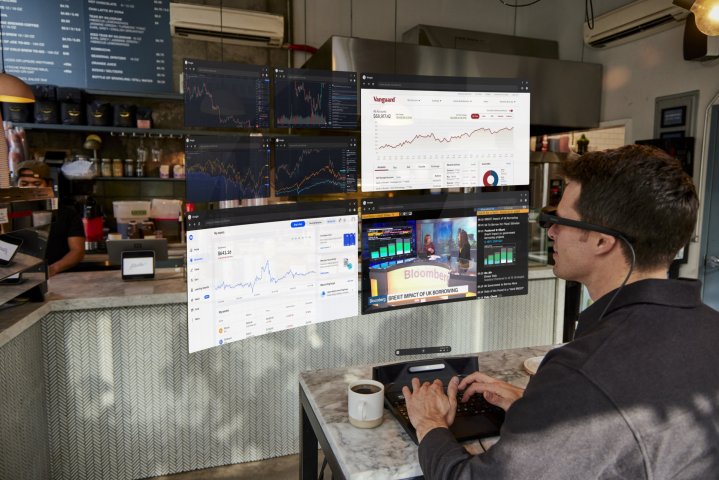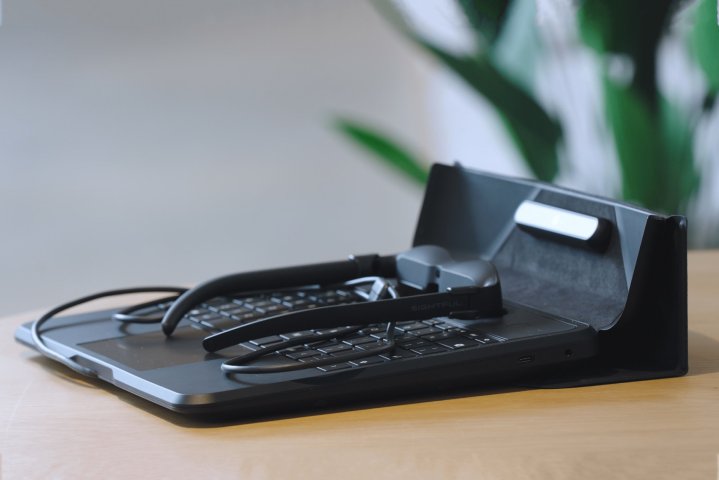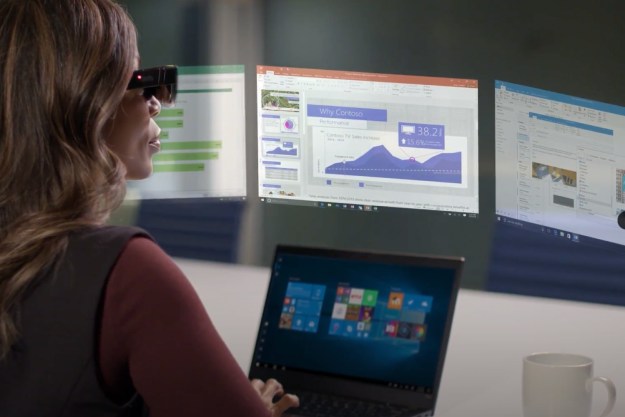
One of the critical factors when buying a new laptop is display size. Do you want a chunky 17-inch model or can you get by with a small and light 13-inch screen? Display size may no longer be relevant in the age of augmented reality, and Spacetop leads the way with the world’s first AR laptop.
Sightful, the company behind Spacetop, points out screen privacy is no longer an issue when working on its 100-inch virtual display. If you take your laptop to the coffee shop and start reviewing sensitive documents, information might leak. With Spacetop, only you see the windows floating in space in front of you.
Spacetop is about the size and weight of a 13-inch laptop. There’s no physical display, but a 5-megapixel webcam is placed on a short backdrop behind the keyboard so you can attend meetings while wearing the wired AR glasses, which look a bit like sunglasses.

The AR glasses are made by Nreal and feature a 53-degree field of view and 1080p per eye resolution, with 6 degrees of freedom (6DoF), allowing screens to be fixed in space around you. The AR glasses include speakers and a microphone. There’s also a dock at the rear to store the AR glasses when you fold up Spacetop for travel. That makes the folded height about an inch and a half, while the footprint is just 10.5-by-9.8 inches. The weight is 3.3 pounds.
It’s an intriguing approach, but performance, usability, comfort, and clarity are unknowns that will require hands-on testing. Sightful claims the Qualcomm Snapdragon 865 processor in Spacetop’s Early Access model provides good performance for AR use but admits it’s not a gaming device.

Spacetop has 8GB memory, 256GB storage, and two 10Gbps USB-C ports that support PD 3.0 and DisplayPort 1.4. That means you can connect other devices and even attach an old-fashioned physical display to share a screen with others. Spacetop has good connectivity, supporting Wi-Fi 6, Bluetooth 5.1, and 5G Sub-6, so you can easily travel with this device.
The battery life is estimated at over five hours, and fast charging provides 85% battery in under two hours. While Spacetop’s battery life seems short for a laptop, competing AR glasses and VR headsets with mixed reality, like the Meta Quest Pro, have very restrictive battery lives of two to three hours of use.
Sightful designed Spacetop for people that primarily use web apps, similar to the design ideals of Google’s Chromebook. Spacetop OS (based on Android) is optimized for browser use and allows multiple screens of varying sizes and positions within the virtual 100″ screen for easy reference and multitasking.
Sightful is starting with a limited release of 1,000 Early Access versions of Spacetop, priced at $2,000. This is an actual product, not a Kickstarter campaign, and delivery to early adopters is expected in July.
You can learn more and sign up to be among the first to try the Spacetop on Sightful’s website.
Editors' Recommendations
- Xreal brings spatial computing to a pair of AR glasses
- Here’s when Apple’s AR glasses could finally go on sale
- Lumus demonstrates futuristic 3,000-nit AR glasses at CES 2023
- AR glasses will have a dedicated Qualcomm chip in 2023
- Nreal’s Air AR glasses head to the U.S., ready to rock with iPhones




